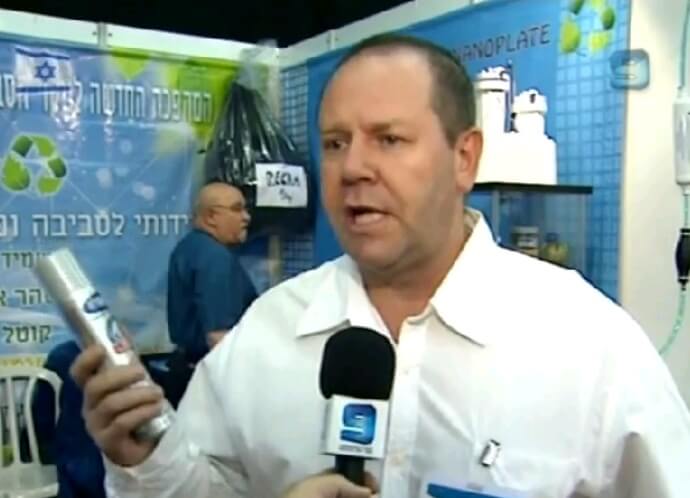The company's CEO, Ricardo Borstein, presented the company's developments at the Nano-Israel conference that took place this week in Tel Aviv

The nanotechnology company "Nanoplate" (Nanoplate) was founded by the Israeli company "Interplate" and is engaged in the development of new cost-effective coatings based on proven nanotechnology. The company focuses on the tremendous potential of nanotechnological applications in the field of self-cleaning surfaces in public buildings and in other areas of life. The company believes that the new technology applications it uses will affect all areas of life and contribute to the goals of humanity in the areas of the environment and new energies. The multidisciplinary technological experience of the company's employees allows it to present a wide variety of unique solutions in the fields of surface technologies, materials science, chemical and environmental hygiene, as well as solutions to combat bacteria.
Hygiene solutions
The company provides small solutions for big problems such as anti-bacterial coatings and additives. It develops devices resistant to ultraviolet radiation and lacking chemicals for disinfection purposes for use in hospitals, public places and private homes.
Hygienic coatings
The company manufactures photocatalytic products that turn ordinary walls into air purification machines using simple spraying methods (similar to spraying paint). These products remove bad odors that are in the air and destroy bacteria, spores and mold that grow on the walls. This light-induced response repels natural threats in a natural way.
Energy-saving coatings
As part of international efforts to reduce energy consumption, the field of nanotechnology provides a simple solution to reduce losses in the field of energy efficiency. This nanotechnology is based on paint layers composed of tiny nanoparticles capable of reducing energy losses by thirty percent. This color also functions as a substance that inhibits the development of bacteria and mold.
Photocatalytic activity of nano-titanium dioxide (TiO2)
The photocatalytic activity of nano-titanium dioxide was discovered in the seventies of the last century. The substance reacts with organic impurities and decomposes into the harmless products carbon dioxide and water. This reaction is essentially similar to the photosynthesis process that occurs in plants. This material can be used simply by spraying methods on internal or external walls. The surface coated with the material layer has self-cleaning properties and such surfaces are already applied in buildings in Japan and other countries. The facades of the buildings coated with the material are able to keep away mold stains and bacteria for a whole decade. The material can also be used for large urban areas to reduce the harmful effect of air pollution and smog. Two such ventures are already operating in Los Angeles and Milan, Italy.
Easy to clean coatings
The field of nanotechnology has given birth to a completely new family of coatings with the lotus effect (a particularly high ability to repel water that exists in the leaves of the lotus flower). This effect makes it possible to repel water and oil from almost any type of surface and make it resistant to dirt and stains and easy to clean. The surfaces can be fibers, metals, glass and any natural or synthetic building material. Easy-to-clean coatings not only make our lives simpler, but they contribute to road safety (prevent low visibility) and significantly reduce the use of cleaning agents (environmentally friendly) at home and in the various industries (energy, food and household).
Disinfection with ultraviolet (UV) radiation and air purification
The use of ultraviolet radiation for water disinfection and purification is well known and well known. The company has developed a new family of cleaning and disinfecting products intended for use in private homes, hotels and hospitals. These products allow disinfection using hand-held devices that are friendly to ultraviolet radiation. This portable device enables effective destruction of bacteria and spores from toothbrushes, keyboards, toilets and mattresses used in hospital beds. The device enables quick and simple operation.
The combined activity of ultraviolet radiation and the photocatalytic titanium dioxide particles embedded in filters gave birth to an innovative air purification system that surpasses in its performance, safety and cost any previous known system (carbon filter, ozone generation, etc.).
Engineering coatings
Based on the company's comprehensive experience in the fields of electrochemistry and electroplating, it offers new technologies of engineering coating with improved properties. These technologies are not only environmentally friendly, but they offer better field performance in terms of hardness, resistance to fusion, low friction coefficients, etc.
water treatment
In recent years, water has become a precious resource, but it usually also contains impurities. These impurities may be biological, organic or inorganic. Water becomes polluted in many different ways: naturally, due to poor storage or due to contact with humans. The company offers simple solutions to prevent water contamination and to control infectious contamination in sub-optimal storage conditions. These solutions can be used for livestock, swimming pools and spas, water reservoirs, storage tanks, etc. The company uses these solutions to desalinate seawater and brackish groundwater and recycle polluted water.
Antibacterial additives
Harmful activity of bacteria and viruses exists everywhere, starting from keyboards, children's toys, and certainly around large places such as hospitals and public toilets. Japanese technology provides us with a new family of additives that can be inserted into the various anti-bacterial products such as paints, various plastics and other types of materials (ceramics, rubber and more). These supplements are safe and scientifically proven.

One response
There is already such technology in Israel, look for NTSI, technology from Germany
http://www.ntsi.co.il